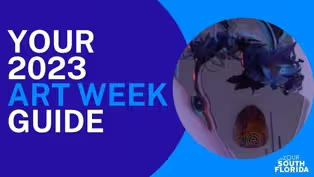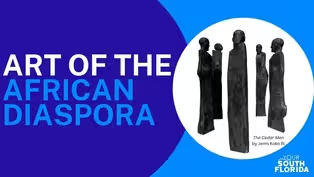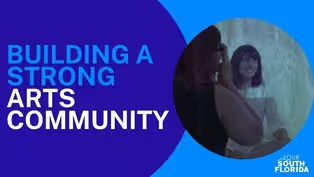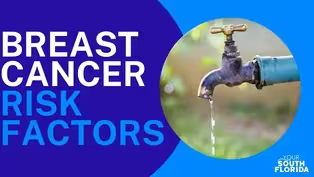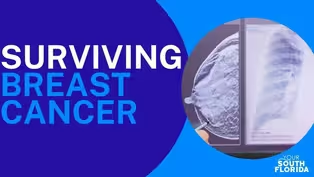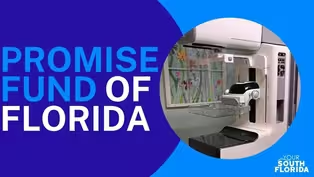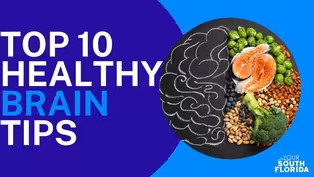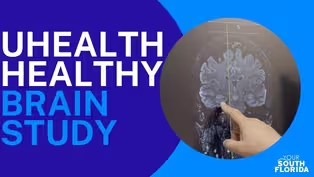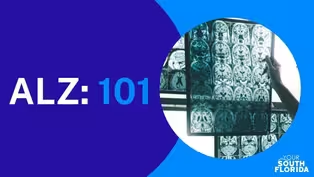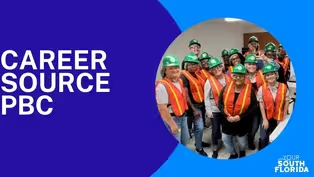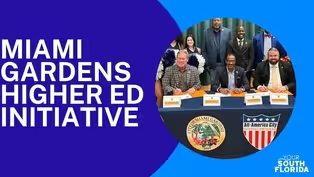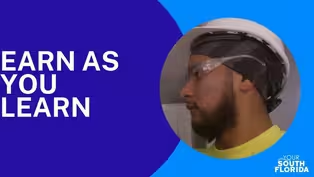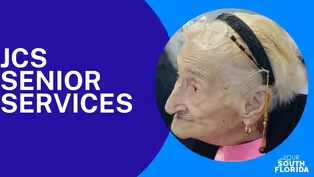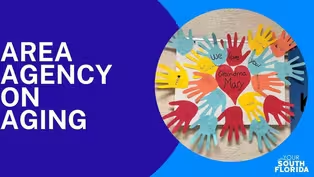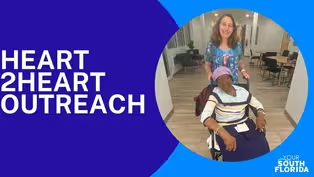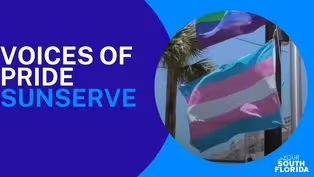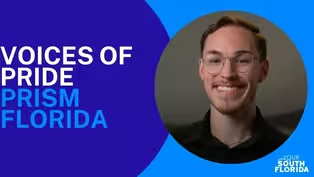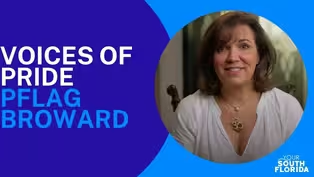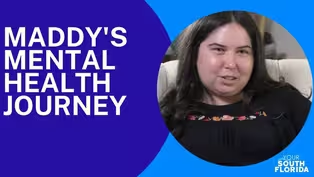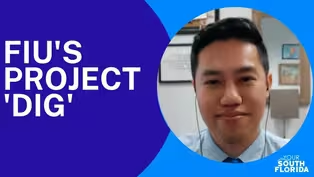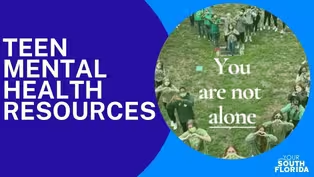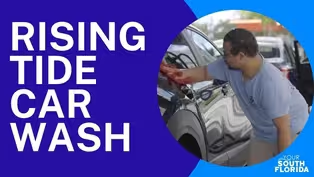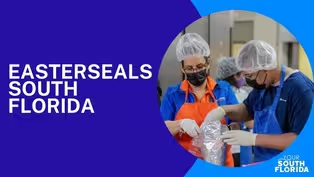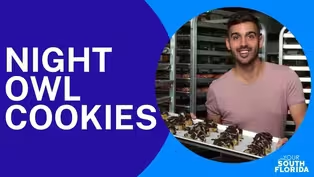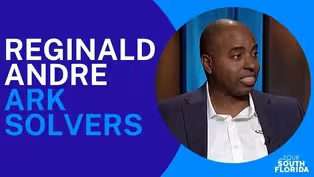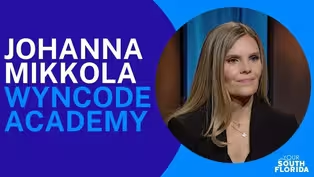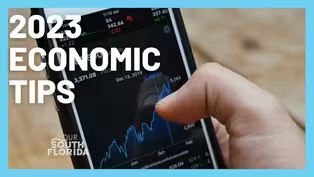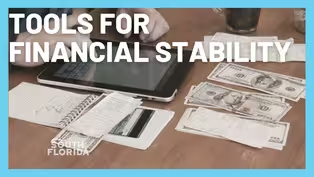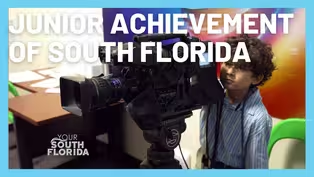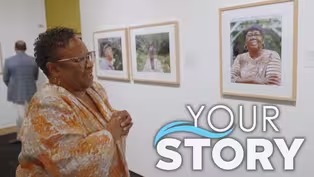Your South Florida
What's in the WATER?
Clip: Season 7 | 9m 38sVideo has Closed Captions
Breast cancer researchers are studying an alarming trend in South Florida.
Breast cancer researchers at Nova Southeastern University are studying an alarming trend in South Florida - the rate of advanced breast cancer here exceeds the state and national average. Lead researcher Jean Latimer, Ph.D. shares more on their findings, why Black women are more at risk, and how the environment plays a role in increasing your chances for a breast cancer diagnosis.
Problems playing video? | Closed Captioning Feedback
Problems playing video? | Closed Captioning Feedback
Your South Florida is a local public television program presented by WPBT
Your South Florida
What's in the WATER?
Clip: Season 7 | 9m 38sVideo has Closed Captions
Breast cancer researchers at Nova Southeastern University are studying an alarming trend in South Florida - the rate of advanced breast cancer here exceeds the state and national average. Lead researcher Jean Latimer, Ph.D. shares more on their findings, why Black women are more at risk, and how the environment plays a role in increasing your chances for a breast cancer diagnosis.
Problems playing video? | Closed Captioning Feedback
How to Watch Your South Florida
Your South Florida is available to stream on pbs.org and the free PBS App, available on iPhone, Apple TV, Android TV, Android smartphones, Amazon Fire TV, Amazon Fire Tablet, Roku, Samsung Smart TV, and Vizio.
Providing Support for PBS.org
Learn Moreabout PBS online sponsorshipbreast cancer researchers at Nova Southeastern University are studying an alarming Trend in South Florida it seems the rate of Advanced Breast Cancer here exceeds the state and national average now with a $100,000 research Grant from the Florida Breast Cancer Foundation NSU researchers are trying to figure out why our next guest is leading the team looking at the environment's role in Advanced Breast Cancer cases particularly among black women here to share more is Dr Latimer director of nsu's AutoNation Institute for breast cancer research and care doctor thank you so much for being here we really appreciate it thank you so walk us through the study how long have you been looking at these cases now particularly in Broward and Miami dat County right we started the study a year and a half ago and we discovered through a a report by the University of Miami and some of the Florida Department of Health literature that there's an increased rate of advanced breast cancers in South Florida and particularly in certain areas in Miami dat and Broward and in looking at these we also discovered that there's a rather high level of arsenic between 40 times to 250 times higher than healthy limits present in the tap water so we wanted to put these things together and we can actually grow cells from reduction mammoplasties women having their breasts made smaller we get these reduction mammoplasties locally from African-American women and uh non-hispanic white women and we are looking at the impact of some of the environmental chemicals from South Florida on these cells so why arsenic in the water here where's that coming from arsenic is a naturally occurring heavy metal it apparently is part of our landscape in South Florida but can also be increased by Agriculture and arsenic has been used in the past on golf courses so those two sources may also be increasing the the naturally occurring arsenic in our water were you surprised to see that much arsenic in the water yes I was um because we South Florida is reputed to have clean water clean air clean land so the other chemical that we looked at arsic is a very well-studied old carcinogen but the other chemical we looked at is a rather new one called glyphosate and it's present in many lawn products and it's part of our food supply it's part of genetic modification of organisms they are made resistant to glyphosate so it's in our food supply but also in our tap water in South Florida where we use glyphosate 12 months of the year not just during a summer season like other parts of the country yeah and we're talking about Advanced breast cancers and we said in the intro more particularly in black women why is it hitting that Community harder than other communities First in south Florida we have a plethora of groups of African ancestry Haitian Bahamian Jamaican they're not quote unquote africanamerican necessarily they're from many places with African ancestry and they're present in South uh Florida in greater numbers than we see in cities like Detroit or Pittsburgh or or um the middle of the country so we think some of the higher uh breast cancer the advanced stage breast cancers are coming from that Community because women of color tend to get a type of breast cancer called triple negative breast cancer and we have no targeted therapy for triple negative breast cancer and it's intrinsically aggressive it's it advances more quickly than the type that uh that uh non-hispanic white women get we often talk about when we discuss breast cancer a genetic component a lot of women are screened for the braa Gene and now other genes that are uh determined to possibly cause cancer but you're saying it's less genetic than it is environmental Al right extremely so it's breast cancer is 80% of the time caused by the environment it's it's considered to be an environmental cancer but environment means lifestyle as well as air water and uh land so people think about air water and land but they don't think about what they're putting on their bodies and in their bodies every day so give us a sense of what those lifestyle choices are what kinds of things are we doing that are impacting us and increasing our risk potentially for for cancer okay so in the African-American Community we know that women of color tend to develop breasts and go into uh adolescence sooner than non-hispanic white women and so there are some important differences and we see those differences when we culture cells in a dish but when we start using cosmetics in our lives is about the time that we're going through these changes so Cosmetics hair care products straighteners uh these are all very important and nail polishes they very often contain carcinogens and so healthier Brands can be found on environmental working group.org ewg.org so you can make healthier choices there are many Brands now that don't have the carcinogens but when you're using these products when you start when you're 12 years old you have a long life of exposure so these things can be controlled alcohol consumption uh if you have children lowers your breast cancer risk and breastfeeding your children significantly lowers your breast cancer risk why is that your breasts are uh produce milk and when they have not produced milk they have not changed into a milk producing gland and the stem cells which change become frustrated over a lifespan of not undergoing that change and they can then change into something that looks more like malignancy so when differentiation or change doesn't happen there's that's a little bit of a problem for the tissue the tissue can change in odd ways what areas are you looking at uh in this study in this research project the historically we've known for 15 years that the higher rates of Advanced Breast Cancer in areas like Miami Dade pemrick Pines uh Lauderdale Lakes uh Plantation there are actually many in the in the area and um so they're not the entire town Hollywood but there are certain zip codes that seem to be very high these are not necessarily associated with poverty or lack of screening they may be more associated with environmental factors such as the arsenic in the water and the glyphosate in the water and the land and then the Arsenic the glyphosate you say we can avoid consuming that by doing what there are now there are affordable filters that will remove glyphosate the charcoal filters the kind of things that are like BRD water water filters there are about six different brands uh when you go on the environmental working group.org there's a tap water uh assessment you can put in your zip cat and it will actually tell you what's in the water and what filters to buy in a pitch to take it out of the water you can actually do this for yourself and every city I've lived in I've always had a picture of one type or the other depending on what yeah my ZIP code contains so what have you learned so far and where do you see yourself going with the study cuz you're sort of new into it you said it's only been about a year and a half so so far we are seeing important differences when we expose women of color versus white women their breast tissue and culture we're seeing important differences in what genes change and we're seeing more endocrine effects in the African-American or the African ancestry for South Florida it's African ancestry because it's not always African-American and in the non-hispanic whites we see more changes in genes that protect from breast cancer that are DNA repair related so these genes get lowered so your your risk of developing breast cancer goes up and so it's different the ancestry makes a difference is what we're learning that it does matter what kind of breast cancer you get depends on your ancestry and how you respond to chemicals in the environment is different based on what we're finding with glyphosate and arsenic what is your advice to people who hear this information whether you're gen carrier a mutation carrier and you're worried about getting breast cancer or you you don't have a a mutation the environment impacts your breast cancer risk and so if you use apps from for example the environmental working group.org and others you can assess you can curate which brands you use for your personal care products this also impacts men endocrine disruptors feminize men and so we don't want to have that in in our male population either and they use hair products and lotions but if you use these instruments to curate your Brands you will live a healthier lifestyle and if you pay attention to genetic modification in your food um corn wheat oats soy and peanuts avoid GMO because they're the highest levels of glyphosat-prozess plants avoid GMO do your research make good choices Dr Gan ladimer thank you so much this was really informative we appreciate it thank you very much
Your Expert Guide to Miami Art Week 2023
Video has Closed Captions
Clip: S7 | 28m 44s | We share tips for your best Miami Art Week 2023 experience. (28m 44s)
Discover The Art Transforming Opa-locka
Video has Closed Captions
Clip: S7 | 10m 27s | Discover The Art Transforming Opa-locka. (10m 27s)
Dennis Scholl on Housing Help for Artists
Video has Closed Captions
Clip: S7 | 8m 51s | Dennis Scholl discusses South Florida's burgeoning art scene & its impact on the economy. (8m 51s)
Video has Closed Captions
Clip: S7 | 9m 38s | Breast cancer researchers are studying an alarming trend in South Florida. (9m 38s)
Latest TIPS for Breast Cancer Prevention and Treatment.
Video has Closed Captions
Clip: S7 | 11m 31s | Join us in this important conversation about breast cancer prevention and treatment. (11m 31s)
Connecting Women to FREE Mammograms
Video has Closed Captions
Clip: S7 | 6m 14s | Early detection is vital to breast cancer survival. (6m 14s)
TOP 10 Tips to Help You LOVE Your Brain
Video has Closed Captions
Clip: S7 | 6m 53s | Learn about early detection and lifestyle changes for maintaining brain health. (6m 53s)
Healthy Brains Helping Researchers Fight Alzheimer's
Video has Closed Captions
Clip: S7 | 7m 9s | We look at how to better treat and prevent Alzheimer’s and related dementias. (7m 9s)
All You Need to Know About Alzheimer's
Video has Closed Captions
Clip: S7 | 12m 58s | We shed light on the latest developments in Alzheimer's care and support. (12m 58s)
Vocational & Workforce Resources
Video has Closed Captions
Clip: S7 | 10m 55s | CareerSource PBC is helping job seekers learn the skills they need. (10m 55s)
Video has Closed Captions
Clip: S7 | 10m 44s | Get the details on a new program making higher education more accessible. (10m 44s)
Video has Closed Captions
Clip: S7 | 5m 7s | We get an inside look at how apprenticeships can be a win-win for students and businesses. (5m 7s)
JCS Providing Meals & Community
Video has Closed Captions
Clip: S7 | 6m 2s | Jewish Community Services of South Florida works to maintain the health of seniors. (6m 2s)
Helpline for Older Adults & Caregivers
Video has Closed Captions
Clip: S7 | 9m 35s | Learn how the Area Agency on Aging of Palm Beach/Treasure Coast is helping older adults. (9m 35s)
Video has Closed Captions
Clip: S7 | 8m 55s | Heart2Heart Outreach of South Florida provides care for lonely seniors. (8m 55s)
Voices of PRIDE: Transgender Community
Video has Closed Captions
Clip: S7 | 5m 59s | We visit SunServe in Wilton Manors to hear from members of the Transgender community. (5m 59s)
Voices of PRIDE: Gen Z & LGBTQ+
Video has Closed Captions
Clip: S7 | 3m 27s | PRISM is a non-profit providing resources to South Florida' LGBTQ+ Gen Z community. (3m 27s)
Voices of PRIDE: A Parent's Perspective
Video has Closed Captions
Clip: S7 | 3m 17s | Lisa McCourt shares her perspective as the mother of a Transgender daughter. (3m 17s)
Video has Closed Captions
Clip: S7 | 4m 12s | We profile Maddy Tasini and her mental health journey. (4m 12s)
FIU Addresses Shortage of School Mental Health Professionals
Video has Closed Captions
Clip: S7 | 6m 34s | FIU has a new program that helps students with mental health issues. (6m 34s)
Mental Health Resources for Teens & Families
Video has Closed Captions
Clip: S7 | 12m 41s | Host Arlene Borenstein looks into local resources for at-risk teens and their families. (12m 41s)
Rising Tide Car Wash's Neurodivergent Workforce
Video has Closed Captions
Clip: S7 | 7m 3s | Rising Tide Car Wash is a successful business thanks to it's non-traditional workforce. (7m 3s)
Culinary Arts Program for Neurodivergent Students
Video has Closed Captions
Clip: S7 | 6m 1s | For decades, Easterseals South Florida has been helping neurodivergent students. (6m 1s)
Andrew Gonzalez l Road to Entrepreneurship
Video has Closed Captions
Clip: S7 | 7m 30s | Miami native Andrew Gonzalez followed his dream of making and selling late-night cookies. (7m 30s)
Reginald Andre l Road to Entrepreneurship
Video has Closed Captions
Clip: S7 | 7m 55s | Hear Reginald Andre talk about his inspirational entrepreneurial journey. (7m 55s)
Johanna Mikkola l Road to Entrepreneurship
Video has Closed Captions
Clip: S7 | 11m 6s | Johanna Mikkola saw the value in bringing a unique brand of coding bootcamps to S. Florida (11m 6s)
Your 2023 Economic Tips l Your South Florida
Video has Closed Captions
Clip: S7 | 9m 42s | Dr. Albert Williams shares his tips for financial health. (9m 42s)
Tools for Financial Stability with United Way Miami
Video has Closed Captions
Clip: S7 | 6m 27s | Nearly 6 out of 10 Miami households are living in or are on the verge of poverty. (6m 27s)
Junior Achievement of South Florida l Your South Florida
Video has Closed Captions
Clip: S7 | 6m 20s | Junior Achievement of South Florida teaches students about finances and building a career. (6m 20s)
Photographing Boca Raton’s Oldest Neighborhood | Your Story
Video has Closed Captions
Clip: S7 | 7m 22s | Founded in 1915, Pearl City is the oldest neighborhood in Boca Raton. (7m 22s)
Providing Support for PBS.org
Learn Moreabout PBS online sponsorshipSupport for PBS provided by:
Your South Florida is a local public television program presented by WPBT
